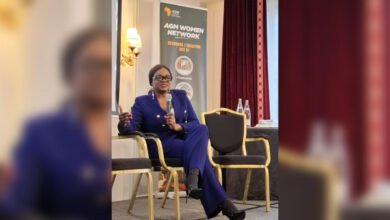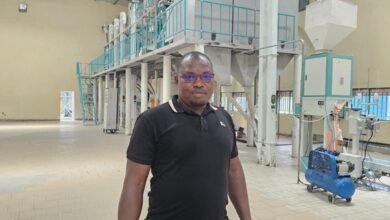AfroChampions An initiative to « make more AfroChampions, in order to positively transform the continent »
Launched at the end of 2016, the AfroChampions Initiative brings together pan-African private institutions and groups driven by the desire to accelerate economic integration.
Below are explanations with Anne-Elvire Esmel, Director of Programs on the Executive Committee of AfroChampions.

What is the meaning of the concept of the AfroChampions Initiative?
We launched this project at the end of 2016. At the origin of the AfroChampions Initiative, rise the pan-African multinationals and their ability to accelerate economic integration, which we believe is the only way to accelerate development from the continent.
We all share this conviction within the AfroChampions executive committee. The more these African companies trade together, the more they favor the emergence of dynamic ecosystems in their activities. If we think of all the subcontractors, SMEs, transport or logistics operators who take advantage of these economic exchanges for their own development, we need more African multinationals to evolve Africa. And that is what we are seeking to do with this project: mobilizing the public and private sectors to achieve this common objective, which is to help the Pan-African private sector to grow, to manufacture more AfroChampions, and to develop the continent. It is this need for public-private dialogue that was put forward when the AfroChampions Club was launched in October 2017 S.E..Mr Albert Muchanga, Commissioner for Trade and Industry of the African Union. Who said he came to listen to ideas from the private sector, because African business leaders often provide practical and effective solutions to face the problems of regional integration.
How do you operate, what are your actions, missions, ambitions?
On a daily basis, the AfroChampions secretariat is provided by ‘Konfidants’, the consulting, studies and research firm in economics behind the project, and the strategic communications firm Impulse Africa. Based in Accra, Ghana, the AfroChampions Initiative finances its activities through private contributions and the publication of research, including economic benchmarks. It collaborates with companies and institutions in Africa and abroad; it has been a partner of the African Union and its department in charge of trade and industry since March 2018, and large investment banks such as Afreximbank or BADEA (Arab Bank for Economic Development in Africa).
In order to have a tangible and positive impact, the AfroChampions initiative has defined four priority projects; they all aimed at supporting the economic integration of Africa. The first priority, capacity building for the next generation of African executives and entrepreneurs; after offering specific training as part of the Djondo grant, we are now working on a larger project, CARAVAN, which aimed, among other things, at setting up regional business incubators and deploying entrepreneurial skills on a large scale and STIM (Sciences, Techniques, Engineering and Mathematics).
The second priority, is the elaboration of reflections and proposals for a successful implementation of the African continental free trade area, through awareness actions among African business communities in all their diversity; the creation of a powerful group of companies « AfroChampions » committed around a charter to promote African integration.
Finally, as a priority to guarantee the facilitation of investments in strategic African projects. It is this last project that particularly mobilizes us today. Our teams have designed a $ 1000 billion Investment Framework in support of the ZLECA, which includes an investment fund, a set of criteria making it possible to make projects eligible for financing with a positive impact on the ZLECA, particularly in energy, transport and connectivity infrastructure, and a mechanism for monitoring the efforts of states to implement the ZLECA treaty and deepen economic integration. This project, developed in partnership with the Department of Trade and Industry of the African Union, was formally presented in Kigali last October during our Boma dedicated to green industrialization, and is currently under review and consultation by African Union bodies and professional associations on the continent.
It is in this context that you recently participated in Crystal Ball Africa 2020 that was held in Accra….
We are honored and pleased to welcome to our executive committee David Ofosu-Dorte, President of AB and David Law, who has organized Crystal Ball Africa for the past seven years, with great success. We particularly like the concept of this event which culminates in a series of economic predictions; this scenario-planning exercise is an original way of raising awareness in the business community, because foreseeing what can happen, according to the working hypotheses at time T, we can impose awareness and we can react and guide each other’s actions. More generally, the theme of CBA 2020 was « the transformative role of ZLECA », a subject that structures the bulk of our activities within AfroChampions. The success of the African common market depends on the capacity of African companies, of all sizes, to meet the challenge of free trade, while developing their activity. We started to make ourselves known in 2018 through roadshows intended to meet professional associations and chambers of commerce to exchange with entrepreneurs, and understand their questions and concerns about the ZLECA but also encourage and explain to them that if they were going soon to be confronted with greater competition in their respective countries. They would also have the ability to think bigger and further by penetrating other markets in neighboring countries or even in other regions of the continent. Last week’s conversations in Accra with CBA are completely part of this outreach process and that was our main goal when we attended the event.
In your opinion, what can be the role of economic actors and civil society in advancing regional integration?
Regional integration was in act during the days of African caravans, and the truth is, the great entrepreneurs who inspired AfroChampions’ vision have done much in the past decades to advance it. When groups like ECOBANK, OCP, MTN or Dangote are active in several countries, provoke fund reflections on the harmonization of economic laws, form multinational and multicultural teams, push for the deployment of infrastructures because they daily need to serve their expansion project, they have an integrating role as well.
The ZLECA Treaty is an opportunity to accelerate this dynamic trade movement, and it is an opportunity for large regional groups and the smallest entrepreneurs to think and act at the continental level. However, ZLECA Treaty is only a framework, which must be given substance. Thus, economic and civil society actors have a key role in it. Giving substance means, first of all, pushing for the establishment of ‘hard’ and ‘soft’ infrastructures that will enable African goods to be produced on an industrial scale and transported to Africa. Energy, transport, traceability systems, connectivity: we are talking about strategic equipment without which nothing is possible.
AfroChampions Investment Framework of 1000 billion dollars, which includes an investment fund and criteria to give priority to projects with positive impact for ZLECA. It is this type of projects that we want to help rising.
Moreover, keeping in mind that the free movement of goods, which is the main concept of ZLECA Treaty, cannot be effective without the free movement of people and freedom of establishment, and ultimately without the free movement of capital.
If you produce cosmetics and you want to optimize your production costs, with cheaper local inputs, or transport costs, it would make sense to set up several workshops or manufacturing centers. Added to that, it would also be logic to establish freedom of establishment which is essential in this regard; however, the protocol on this subject does not yet reach consensus within all African states and civil society can influence this debate.






